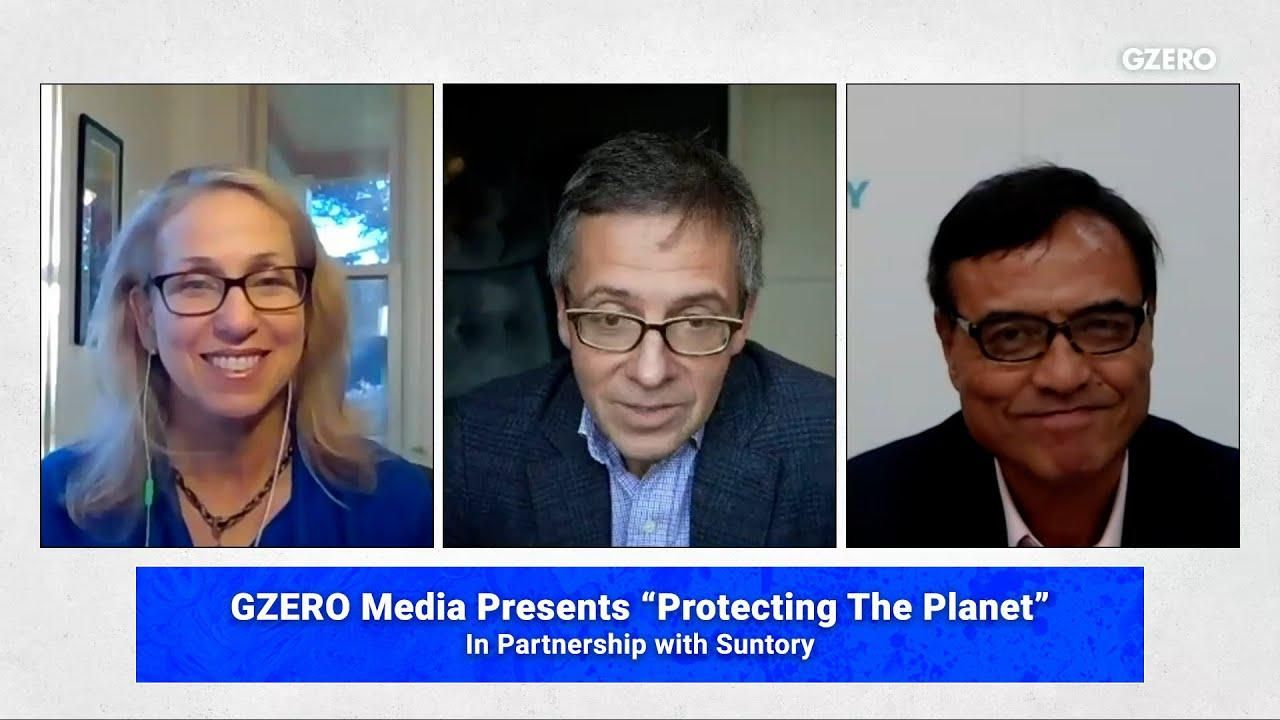
In the lead-up to this year's COP26 climate summit in Glasgow, much of the attention has been focused on last summer's wildfires across the US and Europe, and more recently skyrocketing European energy prices. But what about Asia, the world's biggest and most populated region, which also has the highest share of global carbon dioxide emissions that cause global warming? Asia has unique climate risks but also many opportunities for solutions, and whatever happens at COP26, Asian countries led by China and India are primed to lead the world in the struggle to make the planet greener before it's too late. In a live discussion moderated by Shari Friedman, Eurasia Group's Managing Director of Climate and Sustainability, global experts discussed these and other topics during the first of a two-part Sustainability Leaders Summit sponsored by Suntory.
Eurasia Group and GZERO Media President Ian Bremmer explained why it's time for Asia to turn the narrative on climate policy by leading without following bad examples from the West, how the broader region — especially heavyweights China and India — can actually find common ground on climate despite otherwise disagreeing on everything else these days, and why a lackluster COP26 won't mean failure despite the lack of global leadership on climate.
Suntory CEO Tak Niinami shared his views on why collective action on climate is so complicated in such a diverse region as Asia, the need to consider hydrogen and nuclear power on top of traditional renewables like solar and wind, and why 2050 is too far for companies to make net zero pledges because there's no sense of urgency.
Ko Barrett, vice president of the Intergovernmental Panel on Climate Change, put out some thoughts on why different countries should have different approaches to solve the common problem of climate, why she's hopeful about a good outcome at COP26, and the particular climate risks that Asia faces.
Kevin Rudd, former Australian PM and current CEO of the Asia Society, gave his take on regional leaders and laggards on climate, the global political leadership vacuum on the issue, and the need for all Asian countries — in particular China and India — to work in sync on climate to cut emissions drastically.
Sintesa Group CEO Shinta Kamdani talked about Indonesia's tricky balancing act between climate action and fighting poverty, and why women need to more involved in global climate solutions.
On day two, we turned to a practical application of climate solutions to a very dicey topic: sustainable plastics, which to some sounds like "clean coal." What can we do to dramatically cut down on single-use plastics, and figure out how to recycle all others? Who's most responsible for all of this, and what's the outlook for the future? Our expert guests weighed in.
Tak Niinami clarified why applying currently available technology is as important as developing new tech to better dispose of and recycle plastics.
Ian Bremmer predicted how over time, corporations and tech firms will get sucked into the "gravitational pull" of making plastics more sustainable because it's in their own self-interest — no one wants to get left behind.
Eurasia Group climate & sustainability expert Colleen King described why plastics are such a big problem for Asia's climate, and provided examples of successful recycling initiatives in Indonesia, Japan, and South Korea.
Climate activist Hannah Testa underscored how plastics pollution is finally part of the zeitgeist, with more businesses stepping up to do the right thing because it's linked to climate change, and highlighted the ever-pressing need to refuse single-use plastics and raise awareness about the harm they do to the oceans, the world's biggest carbon sink.
Aloke Lohia, CEO of Indorama Ventures, pointed out why most plastics should be seen as raw material instead of waste because it can be recycled, and the need to double down on that because plastics will get more expensive when we transition away from fossil fuels.
Circulate Capital CEO Rob Kaplan shed light on how the "circular" economy driven by recycling could flip global supply chains on their head, and why sustainable plastics are a huge opportunity for investors in countries that don't even do the basics like India.
Climate Bonds Initiative CEO Sean Kidney illustrated why single-use plastics are partly responsible for the the shocking loss of biodiversity in the past few decades, on the urgency of solving the problem before it's too late, and why governments, manufacturers, and consumers all need to "sing from the same song sheet" to focus on greener plastic use.
Tadashi Maeda, governor of the Japan Bank for International Cooperation, stressed the need to de-risk capital investment in the sector and to spur more public-private partnerships in sustainable plastics.
Anchoring the Summit is a new research report prepared by Eurasia Group, "Unlocking Sustainable Plastics in Asia," which advocates for a much more dynamic role for both the public and private sector in Asia to counter the proliferation of single-use plastic containers, which have had an outsized impact on the environment.
This summit is sponsored by Suntory and co-hosted by GZERO Media and Eurasia Group.